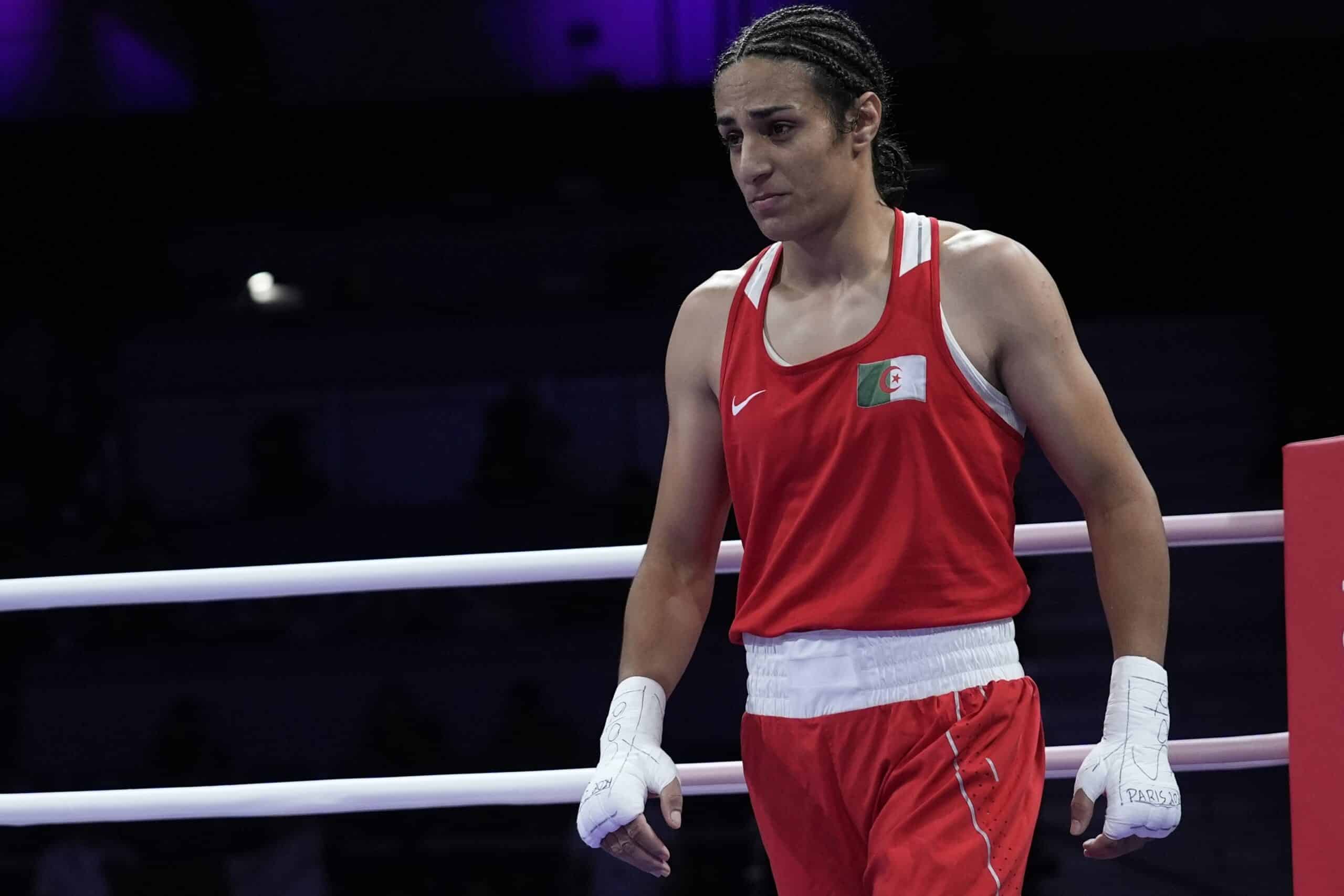
Algeria’s Imane Khelif, reacts after defeating Italy’s Angela Carini in their women’s 66kg preliminary boxing match at the Paris Olympics 2024, Thursday, Aug. 1, 2024, in Paris, France. (AP Photo/John Locher)
PARIS (AP) — IOC President Thomas Bach said the “hate speech” directed at boxers Imane Khelif and Lin Yu-ting at the Paris Olympics is “totally unacceptable.”
“We will not take part in a politically motivated … cultural war,” Bach said at a news briefing Saturday at the midway point of the Paris Games, where he wanted to draw a line under days of global scrutiny about the female boxers’ gender.
“What is going on in this context in the social media with all this hate speech, with this aggression and abuse, and fueled by this agenda, is totally unacceptable,” the International Olympic Committee leader said.
Khelif of Algeria and Lin of Taiwan have been the focus of intense attention — and often inaccurate commentary — because both were disqualified at the 2023 world championships.
The Russian-led International Boxing Association — which has been banished from the Olympics by the IOC in a yearslong dispute — removed the boxers from the world championships 16 months ago in India citing gender-based tests that are still unspecified and unproven.
The women’s boxing issue was linked by Bach to what he called a wider, Russian-led campaign against the IOC and the Paris Olympics, where only 15 Russian athletes are competing as neutrals without their national identity. The IOC and international sports bodies have isolated Russia during the military invasion of Ukraine.
“What we have seen from the Russian side and in particular from the (IBA),” Bach said, “they have undertaken already way before these Games with a defamation campaign against France, against the Games, against the IOC.”
The Algerian Olympic and Sports Committee, in a post on Facebook, said it had filed an official complaint with the IOC to protest the online harassment of Khelif that amounts to “a serious violation of sports ethics and the Olympic Charter by one of the participants in the boxing tournament.”
The Algerian team statement alleged that another boxer — who it did not identify — posted disparaging comments on Khelif and warned that the IOC “has issued a final warning to delete every post that concerns our heroine.”
“We reserve the right to prosecute everyone who participated in the heinous campaign against our heroine Imane Khelif,” the statement said.
Khelif’s opponent later Saturday was to be Anna Luc Hamori in a quarterfinals bout in the women’s 66-kilogram welterweight class.
Both Khelif and Lin, who is a two-time world champion, competed at the Tokyo Olympics in 2021 and did not win medals.
“We have two boxers who are born as women, who have been raised as women, who have a passport as a woman and have competed for many years as women,” Bach said. “Some want to own a definition of who is a women.”
The IBA fueled tensions late Friday saying it would pay Angela Carini — the Italian boxer who stopped fighting against Khelif in the first minute of their bout Thursday — “as if she were an Olympic champion.” The IBA has promised to pay $100,000 for each boxing gold medal, with $50,000 to the boxer and shares also for their coach and national federation.
“Everybody in our world apparently feels obliged to say … anything without really considering the sometimes very complex circumstances,” Bach said. “You will not come to a proper decision if you organize a poll in the social media ‘Do you think this person is a woman or is not a woman?’”
Boxing is the only sport at the Paris Games not being run by an IOC-recognized international governing body.
The tournaments are being organized by an IOC-appointed sports unit, as they were three years ago in Tokyo, because of Olympic leaders’ rift with the IBA over governance and integrity concerns, plus financial dependence on Russian state energy firm Gazprom.
It has all combined to leave boxing in Paris being run by a rule book largely unchanged since the 2016 Rio de Janeiro Olympics — a period when governing bodies for track and field, swimming and cycling have reviewed and updated their eligibility rules addressing gender issues.
Bach challenged critics of Olympic women’s boxing “to come up with a scientific-based new definition of who is a women, and how can somebody being born, raised and competed and having a passport as a woman cannot be considered a woman.”





